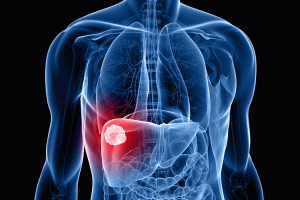
A liquid formulation can kill swathes of liver cancer cells and potentiate chemotherapy treatments, according to a study conducted in mice, rabbits, pigs and human tumour samples.
The liquid could offer clinicians a safer and cheaper "bridge" to keep tumours in check in patients waiting for life-saving liver transplants.
Chemotherapy remains the treatment of choice for patients with hepatocellular carcinoma (HCC), but these drugs have not made a major impact on five-year patient survival rates, which remain dismally low at around 9%.
However, research has shown that liver transplantation can drastically improve outcomes in patients, raising 5-year survival rates to approximately 80%.
Securing a liver transplant is therefore a major priority for clinicians and patients with early-stage disease, but organs are often difficult to find.
In the meantime, clinicians keep tumours in check with local techniques such as thermal ablation - a procedure that vaporises cancer cells with heat - but these approaches are resource-intensive, cannot be applied to all tumours, and can damage surrounding tissues.
Hassan Albadawi and colleagues designed an alternative ablation technique based on an ionic liquid named LATTE, which can deliver both ablating agents and chemotherapy drugs directly into tumours.
The team found that injections of LATTE shrank tumours either alone or in combination with the chemotherapy drug doxorubicin in rat and rabbit models of HCC, and rapidly killed cancer cells in 12 resected human tumours.
"We anticipate that the safety profile of LATTE, its low cost, its simplicity of use, and the flexibility to repeat the procedure will make this [technique] appealing to physicians," the authors say.
We are an independent charity and are not backed by a large company or society. We raise every penny ourselves to improve the standards of cancer care through education. You can help us continue our work to address inequalities in cancer care by making a donation.
Any donation, however small, contributes directly towards the costs of creating and sharing free oncology education.
Together we can get better outcomes for patients by tackling global inequalities in access to the results of cancer research.
Thank you for your support.